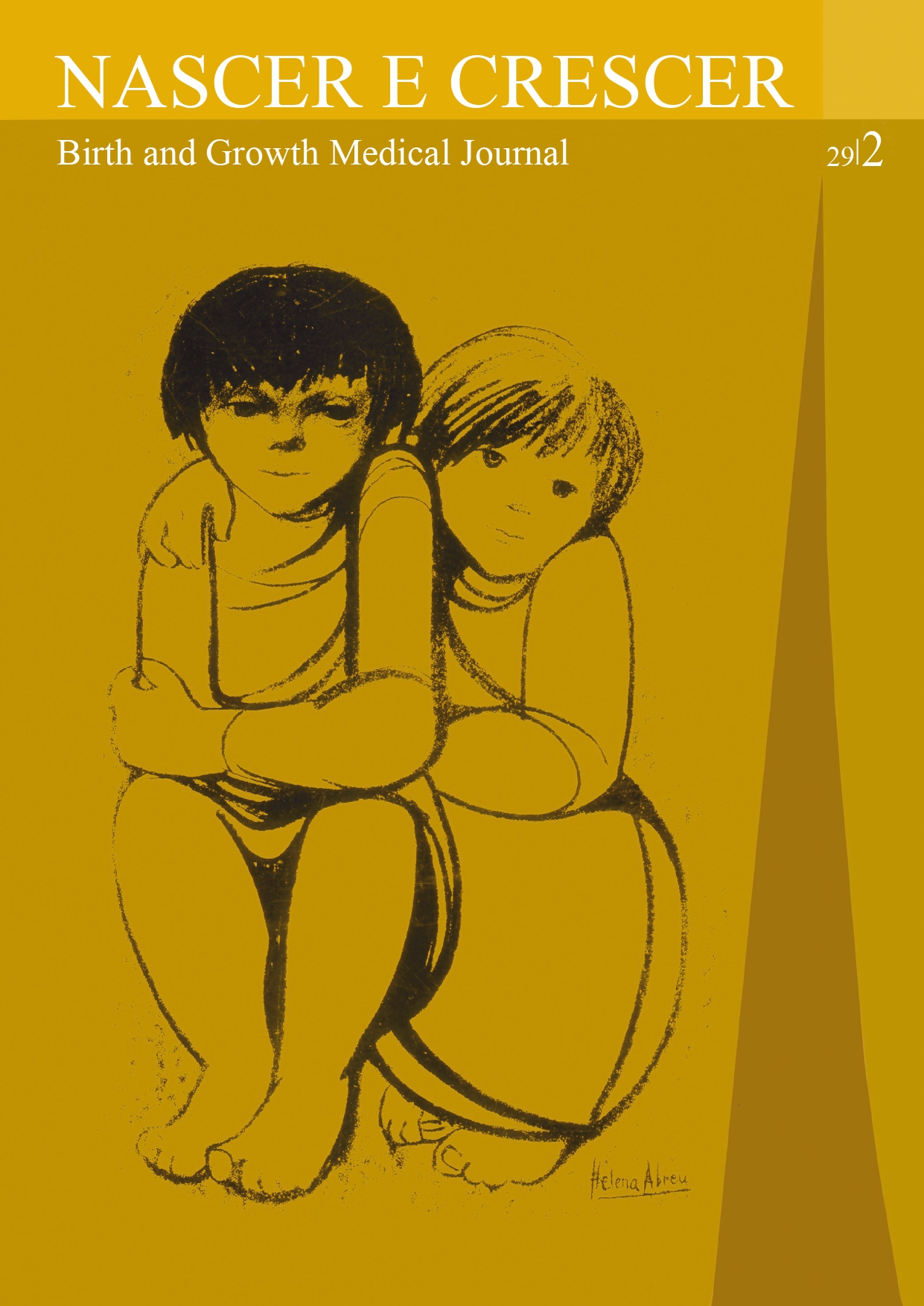Prevenção de abusos sexuais em idade pré-escolar - conhecimentos e atitudes dos educadores
DOI:
https://doi.org/10.25753/BirthGrowthMJ.v29.i2.16660Palavras-chave:
abuso sexual, educadores de infância, idade pré-escolar, prevençãoResumo
Introdução: O abuso sexual (AS) tem uma distribuição global e é transversal a todas as culturas e estratos socioeconómicos. Os educadores detêm uma posição privilegiada na sua prevenção e a abordagem em idade pré-escolar é viável e eficaz. O objetivo deste estudo foi caracterizar os conhecimentos, atitudes e formação dos educadores de infância face à prevenção de AS em idade pré-escolar.
Métodos: Estudo não experimental, transversal e exploratório, compreendendo 47 educadores de infância do concelho de Leiria, Portugal. Os dados foram recolhidos através da aplicação de um questionário elaborado pelos autores.
Resultados: A maioria dos educadores não teve formação sobre prevenção de AS. Cerca de metade considerou o seu grau de conhecimento sobre prevenção de AS razoável, embora 12,8% − maioritariamente educadores com menor tempo de docência − o tenha considerado fraco (50% vs 69.6% com ≥30 anos de docência que o consideraram razoável, p=0.03). A maioria dos participantes, particularmente educadores de infância mais velhos (92% vs 77%, p=0.03), concordou que a prevenção de AS deve integrar o currículo do ensino pré-escolar. A adaptação de conceitos para crianças nesta faixa etária foi um dos fatores apontados pela maioria dos inquiridos como um dos maiores desafios à implementação de programas de prevenção de AS. No entanto, 72,4% dos participantes considerou que alguns tópicos não são adequados para discutir com crianças em idade pré-escolar e 82,9% que a sua abordagem não é bem aceite pelos pais ou cuidadores.
Discussão: Estes resultados evidenciam várias dificuldades e formação limitada dos educadores de infância no âmbito da prevenção de AS. No entanto, a maioria revelou uma atitude positiva face à formação sobre prevenção de AS e inclusão deste conteúdo no currículo do ensino pré-escolar. Este estudo enfatiza a importância de investir em programas de formação dos educadores de infância nesta área.
Downloads
Referências
Beier KM. Preventing Child Sexual Abuse —The Prevention Project Dunkelfeld. J Sex Med 2018; 15:1065-6.
CitakTunc G, Gorak G, Ozyazicioglu N, Ak B, Isil O, Vural P. Preventing Child Sexual Abuse: Body Safety Training for Young Children in Turkey. J Child Sex Abus 2018; 27:347-64.
Enyedy A, Tsikouras P, Csorba R. Medical and Legal Aspects of Child Sexual Abuse: A Population-Based Study in a Hungarian County. Int J Environ Res Public Health 2018; 15:pii: E701. doi: 10.3390/ijerph15040701.
Zhang W, Chen J, Feng Y, Li J, Liu C, Zhao X. Evaluation of a Sexual Abuse Prevention Education for Chinese Preschoolers. Research on Social Work Practice 2014; 24:428-36.
Zhang W, Chen J, Liu F. Preventing Child Sexual Abuse Early: Preschool Teachers’ Knowledge, Attitudes, and Their Training Education in China. Sage Open 2015; 1-8. doi: 10.1177/2158244015571187.
Goldman JDG, Torrisi-Steele G. Education about child sexual abuse on interactive multimedia CD-Rom for undergraduate teachers. Health Education Journal 2004; 63:127-44.
Topping KJ, Barron IG. School-Based Child Sexual Abuse Prevention Programs: A Review of Effectiveness. Review of Educational Research 2009; 79:431-63.
Scherrer A, Van Ballegooij W. Combating sexual abuse of children. Directive 2011/93/EU. European Parliamentary Research Service, Brussels, EU; 2017.
Márquez-Flores MM, Márquez-Hernández VV, Granados-Gámez G. Teachers’ Knowledge and Beliefs About Child Sexual Abuse. J Child Sex Abus 2016; 25:538–55.
Almeida AN, Ramos V, Almeida HN, Escobar CG, Garcia C. Analysis of contextual variables in the evaluation of child abuse in the pediatric emergency setting. J Pediatr (Rio J) 2017; 93:374-81.
Sethi D, Bellis M, Hughes K, Gilbert R, Mitis F, Galea G. European report on preventing child maltreatment. The regional Office for Europe of World Health Organization, Copenhagan, Denmark; 2013.
Scholes L, Jones C, Stieler-Hunt C, Rolfe B, Pozzebon K. The Teachers’ Role in Child Sexual Abuse Prevention Programs: Implications for Teacher Education. Australian Journal of Teacher Education 2012; 37:104-31.
Martyniuk H, Dworkin E. Child Sexual Abuse Prevention: Programs For Children. National Sexual Violence Resource Center Enola, PA; 2011.
Pitts, C. Child sexual abuse prevention programs for pre-schoolers: A synthesis of current evidence. Royal Commission into Institutional Responses to Child Sexual Abuse, Sydney; 2015.
Wurtele SK, Owens JS. Teaching Personal Safety Skills To Young Children: An Investigation Of Age And Gender Across Five Studies. Child Abuse & Neglect. 1997; 21:805-14.
Bergström H, Eidevald C, Westberg-Broström A. Child sexual abuse at preschools – a research review of a complex issue for preschool professionals. Early Child Development and Care. 2016; 186:1520-8.
Kenny MC. Web-based training in child maltreatment for future mandated reporters. Child Abuse & Neglect. 2007; 31:671–8.
McKee BE, Dillenburger K. Child abuse and neglect: Training needs of student teachers. International Journal of Educational Research. 2009; 48:320–30.
Downloads
Publicado
Como Citar
Edição
Secção
Licença
Copyright e Direitos dos Autores
Todos os artigos publicados na Revista Nascer e Crescer – Birth and Growth Medical Journal são de acesso aberto e cumprem os requisitos das agências de financiamento ou instituições académicas. Relativamente à utilização por terceiros a Nascer e Crescer – Birth and Growth Medical Journal rege-se pelos termos da licença Creative Commons "Atribuição - Uso Não-Comercial - (CC-BY-NC)"".
É da responsabilidade do autor obter permissão para reproduzir figuras, tabelas, etc. de outras publicações.
Juntamente com a submissão do artigo, os autores devem enviar a Declaração de conflito de interesses e formulário de autoria. Será enviado um e-mail ao autor correspondente, confirmando a receção do manuscrito.
Os autores ficam autorizados a disponibilizar os seus artigos em repositórios das suas instituições de origem, desde que mencionem sempre onde foram publicados e de acordo com a licença Creative Commons.


